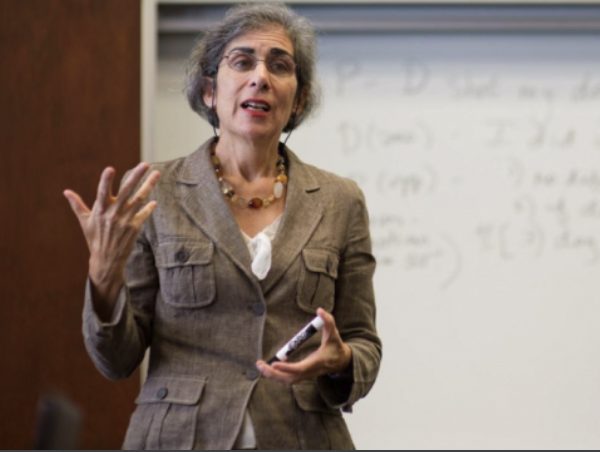Professor Wax Vs. Her University

Wax argues “loss of bourgeois habits” – like completing school, getting married, and working hard – has “seriously impeded" the disadvantaged Tweet

Highlights
Wax argues “loss of bourgeois habits” – like completing school, getting married, and working hard – has “seriously impeded" the disadvantaged
“All cultures are not equal,” she and her colleague wrote, “…in preparing people to be productive in an advanced economy”
Since “people’s background culture can affect their ability to fit into a modern advanced society” we should favor immigrants from similar cultures
Dean Ruger: “her presence here … makes me angry, it makes me pissed off” and that “she still works here … sucks,”
One August day in 2017 University of Pennsylvania Law School Professor Amy Wax was walking down a street in Philadelphia when she ran into a colleague she hadn’t seen in a while. “How’s your summer been?” she casually greeted him. “Terrible!” he scowled. “Oh, no, why?” she asked, concerned he’d had some awful personal tragedy. “Because of you!” he shot back.
The problem? Earlier that month Wax and Professor Larry Alexander of the University of San Diego School of Law had co-authored an opinion piece in The Philadelphia Inquirer entitled “Paying the Price for Breakdown of the Country’s Bourgeois Culture,” arguing that the “loss of bourgeois habits” – like completing school, getting and staying married, and working hard – has “seriously impeded the progress of disadvantaged groups” since the 1960’s. They called on academia, the media and Hollywood to stop “bashing the bourgeois culture” and instead “return to the 1950s posture of celebrating it.” The Inquirer illustrated the piece with a picture of John Wayne.
As if that wasn’t bad enough, Wax and Alexander argued that though these “cultural precepts … could be followed by people of all backgrounds,” they come more easily to some cultures than to others. “All cultures are not equal,” they wrote, “…in preparing people to be productive in an advanced economy.” And though they noted “the single-parent, anti-social habits, prevalent among some working-class whites,” it was what they had to say about “the anti-‘acting white’ rap culture of inner-city blacks” and “the anti-assimilation ideas gaining ground among some Hispanic immigrants” that provoked an outcry. The column was denounced by students and alumni as “steeped in anti-blackness and white hetero-patriarchal respectability,” and Wax was condemned in an open letter signed by two-thirds of her colleagues.
As a heterodox thinker at an Ivy League bastion, Wax, 68, had long been known for challenging prevailing academic orthodoxy. Yet until then, her relations with her colleagues had been largely friendly, she and her medical school professor husband regularly entertaining colleagues at their suburban home.
But as academia has grown ever more “woke,” she’s responded not by keeping her head down but by speaking her mind even more forcefully. To put it mildly, social relations have gotten strained.
Wax grew up in the small city of Troy, NY, north of Albany, a child of the 1950’s “middle bourgeoisie” she defended in the Inquirer op-ed – “people who are not very well connected or in any way privileged.” Her parents were children of Eastern European Jewish immigrants. Her father was in the garment business, working as a cutter and a machinist before eventually buying a small underwear factory. Her mother was an elementary school teacher. “So I regard myself, almost, as kind of a working class girl, certainly as a yeoman class girl,” she says.
While strongly supportive of civil rights like most second-generation Jews of that era, the Waxes “respected tradition and the enduring values” she says, “and always keenly questioned fashionable, newfangled ideas.” Her father, intellectually independent and always willing to go against the grain, had a particular influence on Wax. “He was not a highly educated man” but was extremely intelligent, and “never stopped educating himself.” As a smart, self-taught small businessman he was “suspicious of intellectuals” yet “revered” “intellectual rigor and honesty” and “a searching approach to the truth, to empiricism, to facts and logic.” He “would have liked a much more foot-loose and fancy-free life,” she realized, but “put it aside to do his duty to his family.”
Wax imbibed her parents’ work ethic and devotion to learning, winning piano competitions in high school, then picking up multiple degrees — from Yale (summa cum laude in molecular biophysics and biochemistry); Oxford as a Marshall Scholar; Harvard Medical School; and Columbia Law School, putting herself through law school while working as a neurologist at clinics in Brooklyn and the Bronx. This was an experience, she says, that made her keenly aware that far too many of her poorer patients engaged in self-defeating behaviors that harmed themselves and their children.
After law school, she went on to clerk for the late Court of Appeals Judge Abner Mikva, a liberal former Democratic Congressman who later became Bill Clinton’s White House counsel, and then had a highly coveted stint in the Justice Department Solicitor General’s Office. This was followed by teaching positions at the University of Virginia Law School and Penn.
Two incidents after the Inquirer op-ed have sealed Wax’s status as an academic pariah. First, in a September 2017 discussion with Brown University Professor Glenn Loury on his video podcast, she said that she didn’t think she had “ever seen a black student graduate in the top quarter of the class and rarely … in the top half,” and talked generally about the “mismatch theory” that racial preferences actually harm many talented black students by placing them in more competitive academic environments than they are prepared for, thus setting them up for failure.
When students discovered the video the next spring, they accused her of violating Penn Law’s anonymous grading policy, and demanded she be removed from teaching a required first-year Civil Procedure course that she had taught for years. Law School Dean Ted Ruger acceded to this demand in an email, stating that “black students assigned to her class … may reasonably wonder whether their professor has already come to a conclusion about their … performance” and that her “belittling statements … may adversely affect their learning environment.”
Wax laments that this minute-and-a-half clip in an hour-long discussion led people to “the conclusion that I am completely, adamantly and totally against affirmative action” when her attitude is more nuanced: “it has pros, it has cons, it has costs, it has benefits.” But “we should at least be honest about it and evaluate it on the facts.” Meanwhile Loury, himself a prominent black scholar, strongly condemned the sanction against Wax.
But then followed 2019 remarks on an immigration panel, where she echoed the arguments in her op-ed, saying “people’s background culture can affect their ability to fit into a modern advanced society” and that we should therefore favor immigrants from cultures similar to our own.
Relatively few conservatives, particularly in academia, would take even this position; but Wax was not content to leave it at that. She went on to say: “we are better off if our country is dominated numerically, demographically, politically … by people from the First World, from the West, than by people from countries that had failed to advance.” She added: “the most important reason that the cultural case for limited immigration remains underexplored, is that bête noire – race. Embracing … cultural distance nationalism, means, in effect, taking the position that our country will be better off with more whites and fewer non-whites.”
Though Wax stressed that this would not be the intent of a cultural distance policy but merely the result, she characteristically stood by her words, painful or infuriating as others might find them, on the grounds they were an accurate reflection of reality, backed up by the data.
In the ensuing outcry, Dean Ruger condemned her comments as “repugnant.” At a student town hall meeting to (to which Wax was not invited) he stated that “her presence here … makes me angry, it makes me pissed off” and that “she still works here … sucks,” but that “the only way to get rid of a tenured professor is this process … that’s gonna take months.”
The process was indeed instituted 19 months later, with a formal (non-public) complaint filed on behalf of anonymous students and alumni seeking Wax’s termination or the revocation of her tenure. While termination of tenured faculty is extremely rare in academia, Penn’s vaguely worded Faculty Handbook does allow for termination for “flagrant disregard of the … mission of the University.” Dean Ruger’s statement condemning Wax’s immigration views had affirmed that “diversity” is “central to our mission,” so a Sword of Damocles now hangs over her head.
The larger question, one ultimately more vital than the fate of this one fiercely independent recent grandmother, is what is allowable. Have we reached the point where certain opinions are, in the prevailing view, so dangerous, even inflammatory, that they are no longer open for argument and debate?
Wax, for her part, quotes physicist Richard Feynman. “I would rather have questions that can’t be answered than answers that can’t be questioned.”






